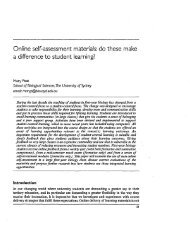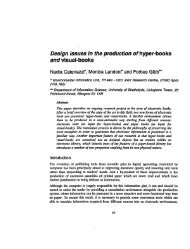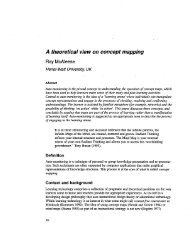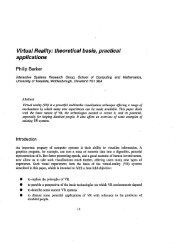- Page 1 and 2: ALT-C 2011 18th international confe
- Page 3 and 4: 0303 Plen: Keynote Speaker 3 The el
- Page 5 and 6: 0504 INV: Invited Speaker 4 The cit
- Page 7 and 8: 0508 INV: Invited Speaker 6 The ROI
- Page 9 and 10: 0806 Spon: Sponsor session by Black
- Page 11 and 12: 0001 PP: Pedagogic Research Using H
- Page 13 and 14: 0009 WS: World Collaboration Open L
- Page 15 and 16: 0013 SP: Making Pedagogy Embedding
- Page 17 and 18: 0015 PK: PechaKucha 3 Project SOAR
- Page 19: 0017 SP: Collaborative Tchnology Op
- Page 23 and 24: Carr, W., and Kemmis, S., 1986. Bec
- Page 25 and 26: 0033 SP: Restructuring Teaching Pro
- Page 27 and 28: 0037 SP: Supporting Teachers User-c
- Page 29 and 30: 0039 SP: Supporting Teachers The sp
- Page 31 and 32: 0043 SP: Collaborative Tchnology Sc
- Page 33 and 34: 0045 SP: Observation Pandas, Skelet
- Page 35 and 36: 0047 SP: Technology and Salaries We
- Page 37 and 38: 0050 Demo: Using Technology to make
- Page 39 and 40: 0053 SP: Teacher preparation Are we
- Page 41 and 42: 0057 SP: Pedagogy for Progress Skyp
- Page 43 and 44: 0058 PK: PechaKucha 1 A model of bl
- Page 45 and 46: 0060 SP: Sustainable Support Using
- Page 47 and 48: 0063 Demo: Smart working More than
- Page 49 and 50: 0065 PK: PechaKucha 3 An investigat
- Page 51 and 52: Summer 2006; 29, 1;CBCA Education p
- Page 53 and 54: 0068 WS: From Challenge to Change F
- Page 55 and 56: 0070 SP: Managing Change Can techno
- Page 57 and 58: 0072 SP: Technology in the Curricul
- Page 59 and 60: 0074 Demo: Sharp Technology 2 A plu
- Page 61 and 62: 0078 Symp: We are all in this toget
- Page 63 and 64: 0081 PP: Pedagogic Research Develop
- Page 65 and 66: 0083 SP: Making Management Getting
- Page 67 and 68: 0085 SP: Managing Change Not future
- Page 69 and 70: 0087 SP: Pedagogic Teachers’ Adva
- Page 71 and 72:
0089 Symp: Re-imagining Learning Re
- Page 73 and 74:
0091 Demo: Support Tools Technology
- Page 75 and 76:
0093 SP: Sustainable Support Infect
- Page 77 and 78:
0096 SP: Pedagogy for Progress A mo
- Page 79 and 80:
0097 Demo: Teachers’ Technology H
- Page 81 and 82:
0099 SP: Evidence for Management Tr
- Page 83 and 84:
0102 SP: Sharp Technology 2 Open Ed
- Page 85 and 86:
0104 Demo: Lecture Capture Using Au
- Page 87 and 88:
0107 WS: Preparing for the Thaw Pre
- Page 89 and 90:
0110 PK: PechaKucha 3 The challenge
- Page 91 and 92:
0112 SP: Delivery through Technolog
- Page 93 and 94:
0114 SP: Observation Peer observati
- Page 95 and 96:
0118 SP: Learning Situations Ways o
- Page 97 and 98:
0121 WS: Standards- based Assessmen
- Page 99 and 100:
0125 Demo: Teachers’ Technology O
- Page 101 and 102:
0128 WS: Cloud Learning with Google
- Page 103 and 104:
0130 SP: Policy at the Sharp End eS
- Page 105 and 106:
0131 Demo: Using Technology to make
- Page 107 and 108:
0133 SP: Learning Situations The Vi
- Page 109 and 110:
0135 PP: Photomarathons and Assessm
- Page 111 and 112:
0137 PP: Rigourous Pedagogy Analysi
- Page 113 and 114:
0139 SP: Large Scale Effects How ca
- Page 115 and 116:
0142 Symp: Is the VLE reborn? Is th
- Page 117 and 118:
0144 SP: Support for learning The B
- Page 119 and 120:
0146 SP: Project Results One Year O
- Page 121 and 122:
0148 PK: PechaKucha 4 Matchmaking L
- Page 123 and 124:
0150 SP: Policy at the Sharp End Sq
- Page 125 and 126:
0152 SP: Teacher preparation Leader
- Page 127 and 128:
References Charlton, P., & Magoulas
- Page 129 and 130:
0155 SP: Pedagogy for Progress Stud
- Page 131 and 132:
0158 SP: Worlds of Learning Breakin
- Page 133 and 134:
0159 SP: Sharp Technology 2 Are we
- Page 135 and 136:
0161 PP: Photomarathons and Assessm
- Page 137 and 138:
0163 SP: Curriculum Advancement The
- Page 139 and 140:
0165 PK: PechaKucha 5 So, what do y
- Page 141 and 142:
0167 WS: Moving VLE Moving 5000 cou
- Page 143 and 144:
0171 SP: Research in Learning Searc
- Page 145 and 146:
0173 PK: PechaKucha 1 Data Mining f
- Page 147 and 148:
0175 SP: Institutional Action Stude
- Page 149 and 150:
0177 PK: PechaKucha 2 Clickers in t
- Page 151 and 152:
0180 SP: Curriculum and APEL Curric
- Page 153 and 154:
0183 SP: Delivery through Technolog
- Page 155 and 156:
DEMOMONSTRATION - Illustrations of
- Page 157 and 158:
0188 SP: Teaching Pedagogy Understa
- Page 159 and 160:
0190 PK: PechaKucha 6 If the lectur
- Page 161 and 162:
0194 WS: Enhancing Synergies Enhanc
- Page 163 and 164:
0196 SP: Pedagogy for Progress Buil
- Page 165 and 166:
0198 SP: Institutional Action SET f
- Page 167 and 168:
0200 Demo: Help for Teachers 2 Brin
- Page 169 and 170:
0201 WS: The Digital Practitioner T
- Page 171 and 172:
0202 SP: Evidence for Management De
- Page 173 and 174:
0203 WS: On-line Accessibility OASE
- Page 175 and 176:
0205 Demo: Help for Teachers 1 Back
- Page 177 and 178:
0207 Demo: Classroom Techniques Thr
- Page 179 and 180:
0210 PK: PechaKucha 3 Developing a
- Page 181 and 182:
0212 SP: Teachers’ Friends HEAT i
- Page 183 and 184:
0214 SP: Assessment and Curriculum
- Page 185 and 186:
0216 SP: Teaching Pedagogy Hearing
- Page 187 and 188:
0218 PP: Sharp end research Towards
- Page 189 and 190:
0220 SP: Happening Resources Extrao
- Page 191 and 192:
0222 SP: Sharpt Technology 2 OERs:
- Page 193 and 194:
0225 PK: PechaKucha 1 A web based s
- Page 195 and 196:
0227 SP: Teachers’ Friends Smartp
- Page 197 and 198:
0229 SP: Restructuring Teaching Rem
- Page 199 and 200:
0232 Demo: VLE Innovation Using VLE
- Page 201 and 202:
0235 SP: Pedagogic Advance Designin
- Page 203 and 204:
0238 SP: Pedagogic Teachers’ Adva
- Page 205 and 206:
0241 PK: PechaKucha 2 Appreciative
- Page 207 and 208:
technology (2nd edition) London: Ro
- Page 209 and 210:
0245 Symp: The High Costs of Giving
- Page 211 and 212:
0251 SP: Technology and Salaries As
- Page 213 and 214:
0254 SP: Technology Standards mobil
- Page 215 and 216:
0256 SP: Assessment and Curriculum
- Page 217 and 218:
0258 SP: Happening Resources Influe
- Page 219 and 220:
0260 SP: World Collaboration What w
- Page 221 and 222:
0262 Demo: Help for Teachers 1 Onli
- Page 223 and 224:
0264 SP: Curriculum Advancement Cur
- Page 225 and 226:
0402 : Flexible Service Delivery Fl
- Page 227 and 228:
Lavelle, Suzanne...................







